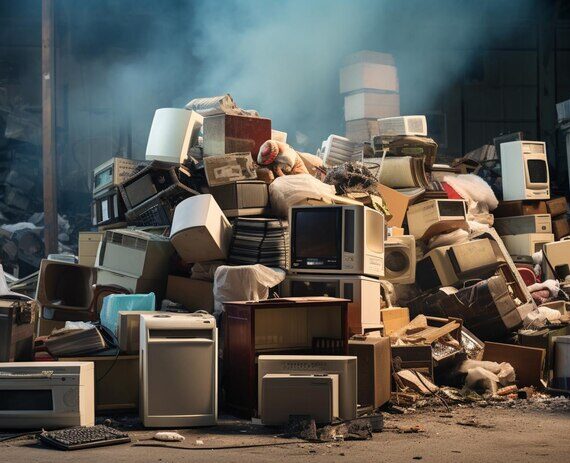
5 Innovative Technologies Revolutionizing E-Waste Recycling Industry
Electronic waste, or e-waste, has become a significant environmental concern in the digital age. The technology’s rapid advancement leads to shorter product life cycles, resulting in a massive amount of discarded electronics. To tackle this growing problem, innovators and researchers are continually developing new technologies to revolutionize the e-waste recycling industry. These innovative solutions aim to streamline the recycling process, recover valuable materials, and reduce the environmental impact of electronic waste. Let’s explore five of these groundbreaking technologies transforming the e-waste recycling landscape:
Advanced Technologies That Impacting E-waste Recycling
1. AI-Powered Sorting Systems:
Traditional e-waste recycling involves manual sorting, which is time-consuming and prone to errors. AI-powered sorting systems leverage advanced machine learning algorithms to automate and optimize the sorting process. These systems utilize sensors and cameras to analyze electronic waste items rapidly. They can accurately identify and categorize various materials such as metals, plastics, circuit boards, and other components through image recognition and data processing. By automating the sorting process, AI-powered systems significantly increase efficiency, minimize errors, and reduce labor costs, ultimately enhancing the overall effectiveness of e-waste recycling operations.
2. Chemical Recycling:
Chemical recycling technologies offer an alternative approach to traditional mechanical recycling methods. These processes involve breaking down e-waste materials into their chemical constituents through various chemical reactions. Pyrolysis, for example, uses high temperatures in the absence of oxygen to decompose plastics into liquid or gaseous products that can be further refined into new materials. Solvolysis employs solvents to dissolve and separate polymers from other materials in e-waste. Chemical recycling enables the recovery of valuable resources from complex electronic components that are difficult to recycle through mechanical means. It also reduces the energy requirements compared to traditional recycling processes and can handle a broader range of materials, contributing to a more sustainable approach to e-waste management.
3. Modular Design for Easy Disassembly:

Traditional electronics often feature integrated designs that make disassembly and recycling challenging. However, a shift towards modular design principles makes electronic devices more easily recyclable. Modular design involves breaking down products into interchangeable modules or components that can be easily assembled and disassembled. By incorporating standardized connectors and fasteners, manufacturers facilitate the separation of different materials during the recycling process. This approach not only simplifies recycling but also extends the lifespan of electronic products by allowing for easy repair and component replacement. Ultimately, modular design promotes resource efficiency and reduces electronic waste by enabling more straightforward disassembly and recycling.
4. 3D Printing for Upcycling:
3D printing technologies are increasingly being used to upcycle e-waste materials into new products and components. Instead of simply recycling materials into raw form, 3D printing offers a creative way to transform discarded electronic components into useful items. For example, old circuit boards can be shredded and processed into filaments for 3D printers, which can be used to create customized parts or products. This approach reduces waste and adds value to recycled materials by turning them into unique and functional objects. Manufacturers can promote circular economy principles by leveraging 3D printing for upcycling, minimizing reliance on virgin materials, and encouraging product design and manufacturing innovation.
5. Blockchain Traceability:
Blockchain technology offers a decentralized and transparent ledger system that can track the entire lifecycle of electronic devices, including production, distribution, and recycling. By recording transactional data in a secure and immutable manner, blockchain enables stakeholders to verify the authenticity and provenance of electronic products and their components. In the context of e-waste recycling, blockchain can enhance transparency and accountability by documenting key information such as material composition, recycling processes, and environmental impact. This ensures that e-waste is managed responsibly and ethically, reducing the risk of illegal disposal or exportation to developing countries. Blockchain traceability promotes trust among consumers, regulators, and recycling organizations, driving towards a more sustainable and circular approach to e-waste management.
Final Outcome!
These are just some exciting advancements transforming the e-waste recycling industry. By embracing these innovations, we can create a more sustainable future where our discarded electronics become the building blocks for a greener tomorrow. Let’s all be responsible stewards of technology, and together, we can turn the tide on e-waste!
Read Our More Blogs:
Challenges of E-Waste from Emerging Technologies
Impact of E-Waste on Climate Change







